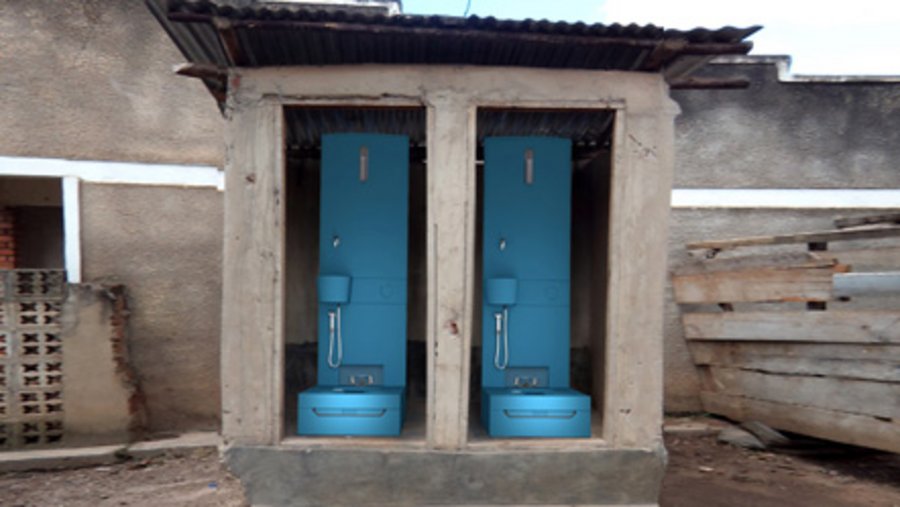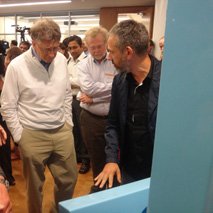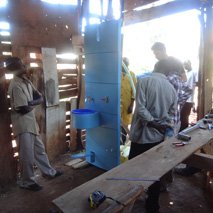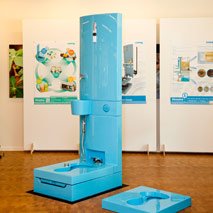EOOS and Eawag present toilet of the future

Photo montage of an existing toilet facility complemented by the “diversion toilet” by EOOS and Eawag
Photo: EOOS

Photo montage of an existing toilet facility complemented by the “diversion toilet” by EOOS and Eawag
Photo: EOOS

Bill Gates and Harald Gründl, designer of EOOS und sientist of Eawag at the presentation at August 14th 2012. Photo: EOOS
Already 2011, the Bill & Melinda Gates Foundation awarded eight universities around the world grants to reinvent the toilet. It should be affordable for the poor (less than 5 cents per day per person), clean, safe and universally applicable, in order to help those who have no or inadequate sanitation. According to the foundation, 2.5 billion people are affected by this condition. This problem has serious health and social consequences and is a cause of disease and death.

Installation of the diversion toilet in Kampala, capital of Uganda.
Foto: EOOS; Eawag
Now, researchers from around the world, including eight foundation grantees who are part of the Reinvent the Toilet Challenge, presented their concept for a new toilet from 14 to 15 August at the “Reinvent the Toilet Fair” in Seattle (USA). The fair showcased innovations from around the world that are creating a new vision for the “next generation” of sanitation and aims to inspire collaboration around a shared mission of delivering a reinvented toilet. “We have designed a toilet that works everywhere, from the slums of Kampala to a millionaire’s weekend home in the country,” says Harald Gründl of EOOS Design.
This collaboration between the Swiss aquatic research institute Eawag and the design firm EOOS is unusual but necessary, in order to bring advanced technology into a form suitable for everyday use. The result of this intensive exchange between Vienna and Zurich over the past year is the “diversion toilet”: a squat toilet that separates urine and feces, offers clean water for hand washing and cleaning the facility, requires no sewer or water connections and can be locally produced – all for 5 cents per day per person. A service concept is also being introduced in order to implement this system for the long term.

The diversion toilet combines the design knowledge of EOOS with the technical know-how of Eawag – and bears the seeds of a real design revolution. Photo: EOOS; Eawag
The toilet’s internal water circulates and is sterilized using a procedure developed by Eawag. Thus for the first time it will be possible to make clean water available for personal hygiene in regions lacking their own water supply. Feces and urine are collected separately from one another in a narrow container located underneath the toilet bowl, which is replaced every three to four days. Urine and feces are then processed in an additional step, for example, into fertilizer or biogas. Eawag is providing necessary technologies for recycling and processing the water.
The “diversion toilet” is ultra-compact, entirely chemical-free and can be easily transported. The processing of the urine and feces and the fact that the toilets can be set up completely self-sufficiently – without sewer, electricity or water connections – enables a form of contracting: the toilet will be operated and rented out by microenterprises. “Whether our system can really be implemented depends on how good our business model is. No solution that relies on permanent subsidies will function over the long term,” says process engineer and Eawag project manager Tove Larsen. In this age of expanding cities, scarce resources and related infrastructure demands, EOOS and Eawag’s innovation could also have a significant impact on the developed world.
Further information: